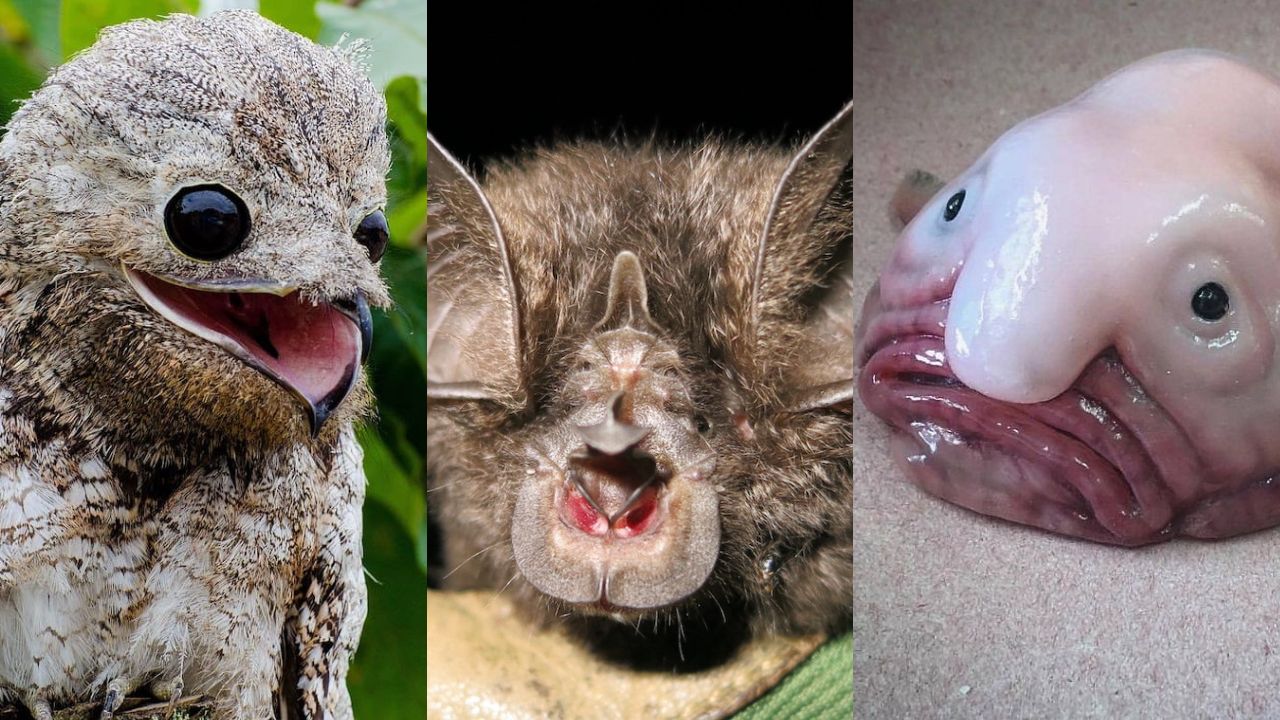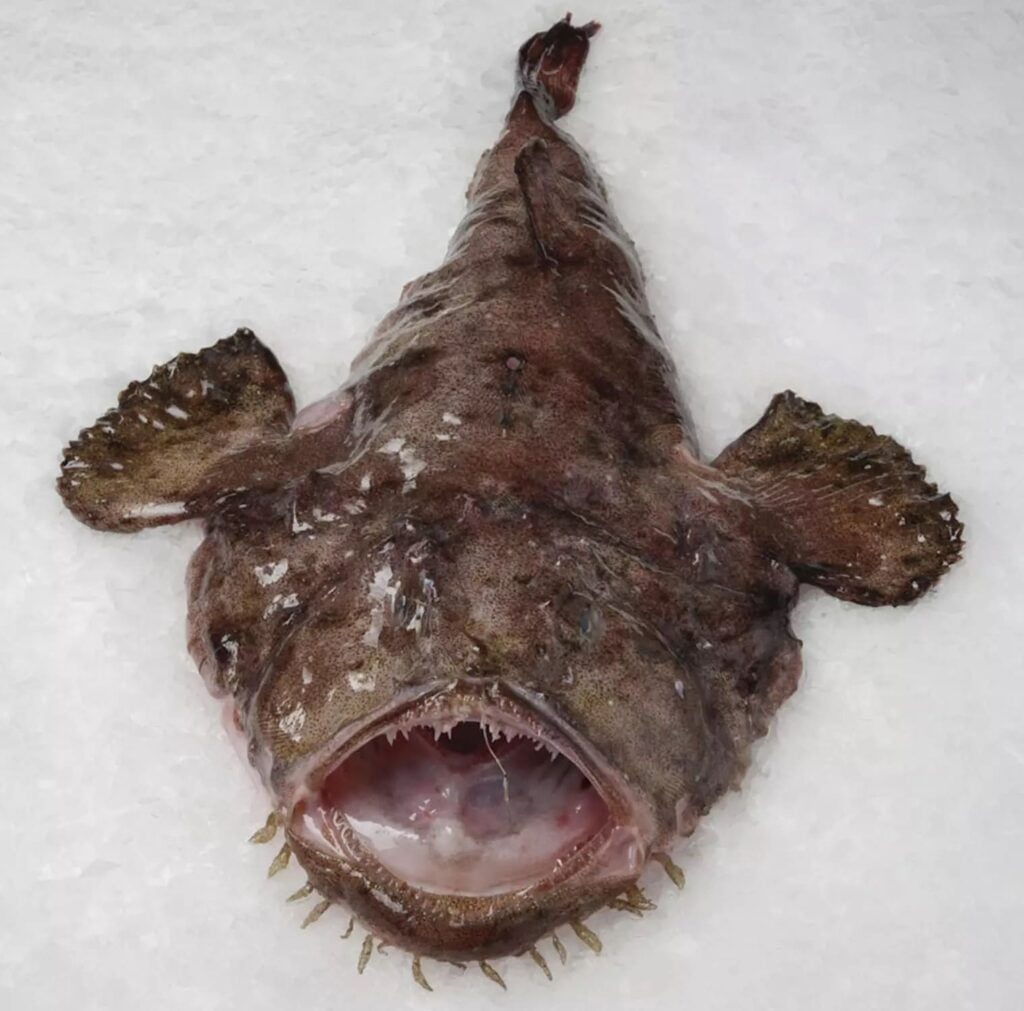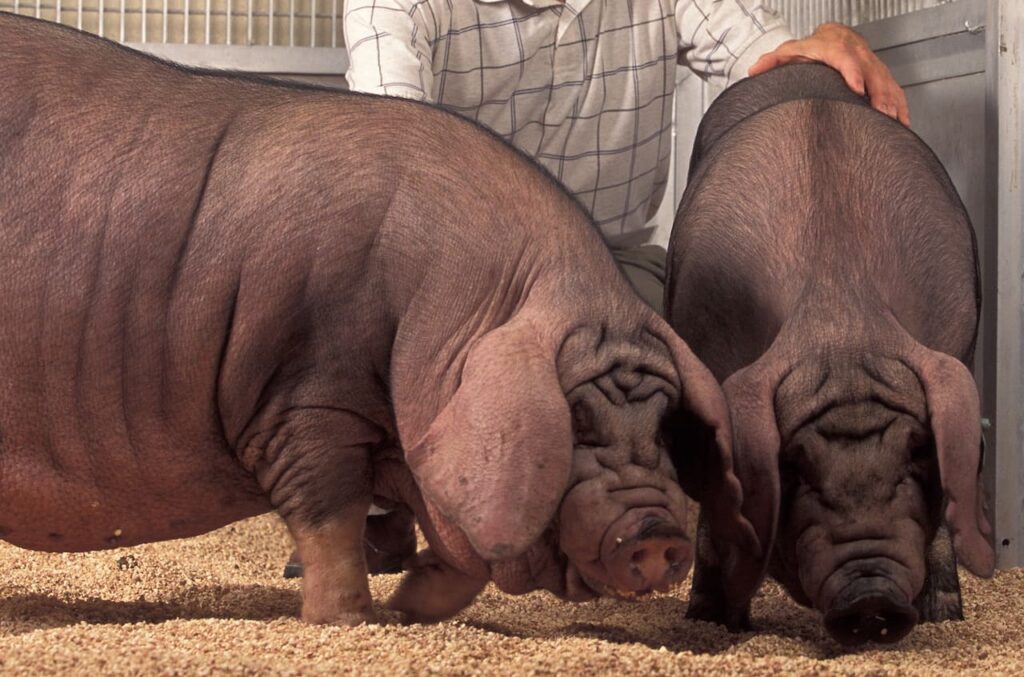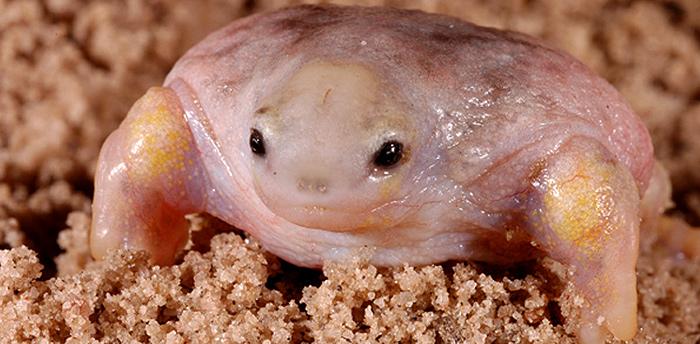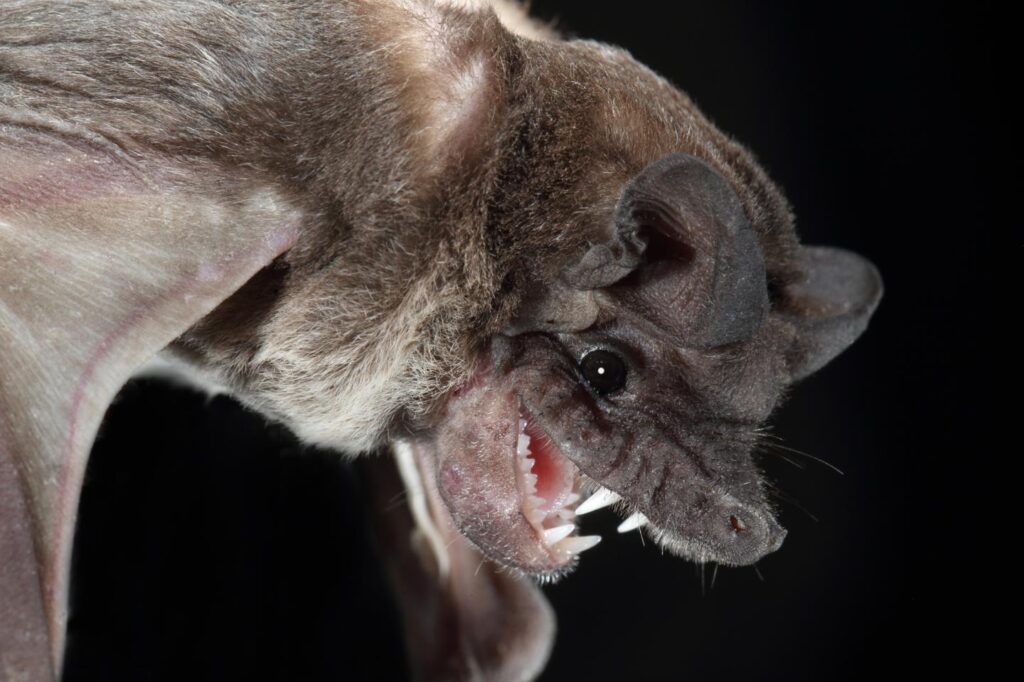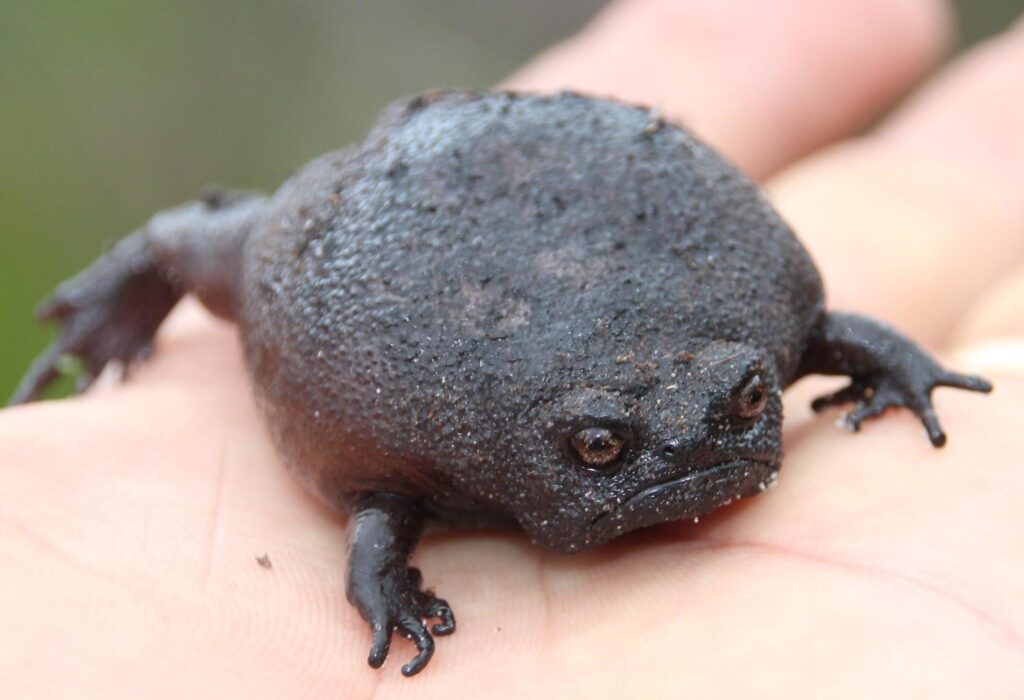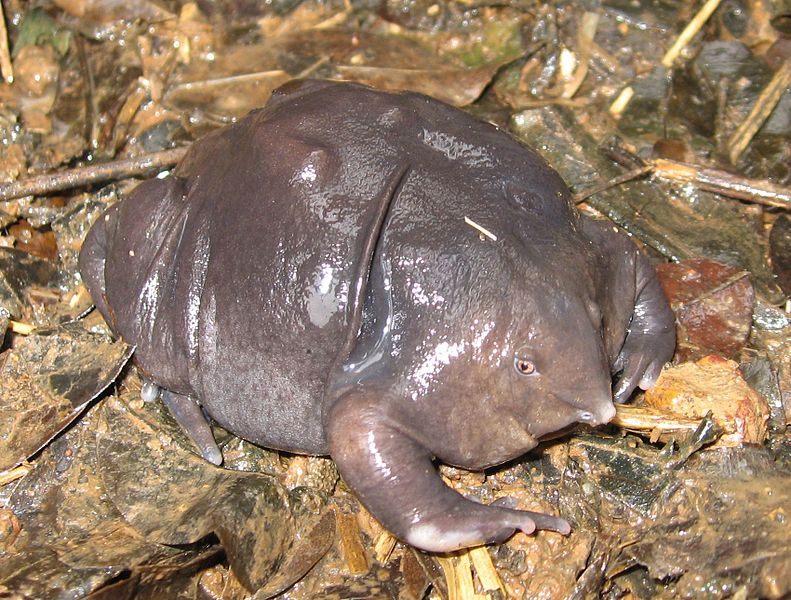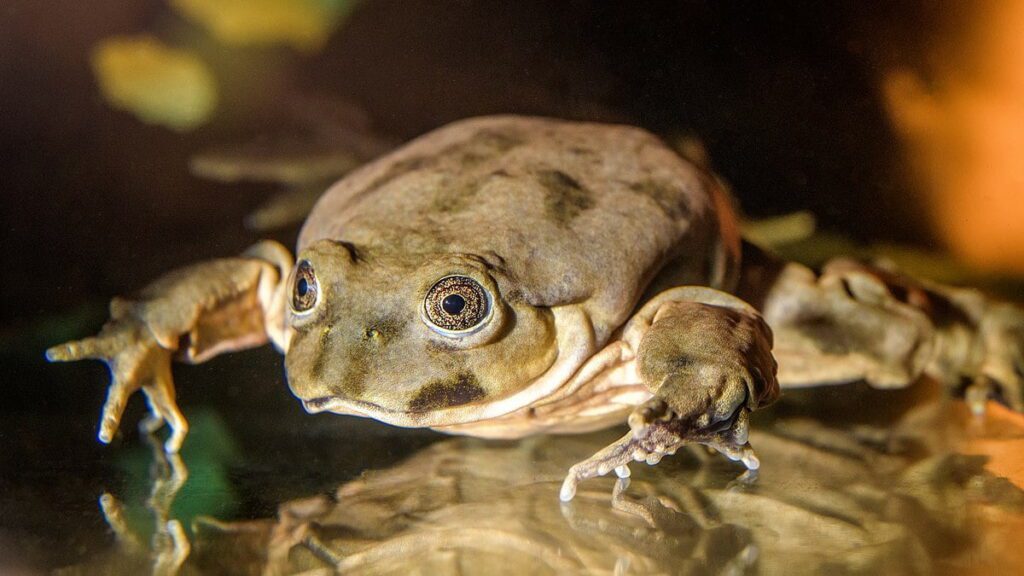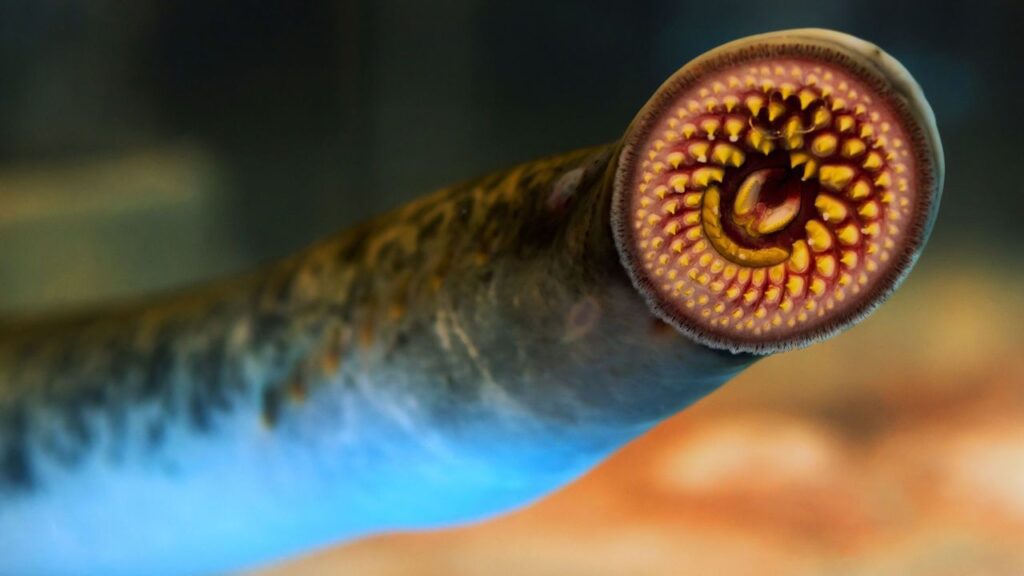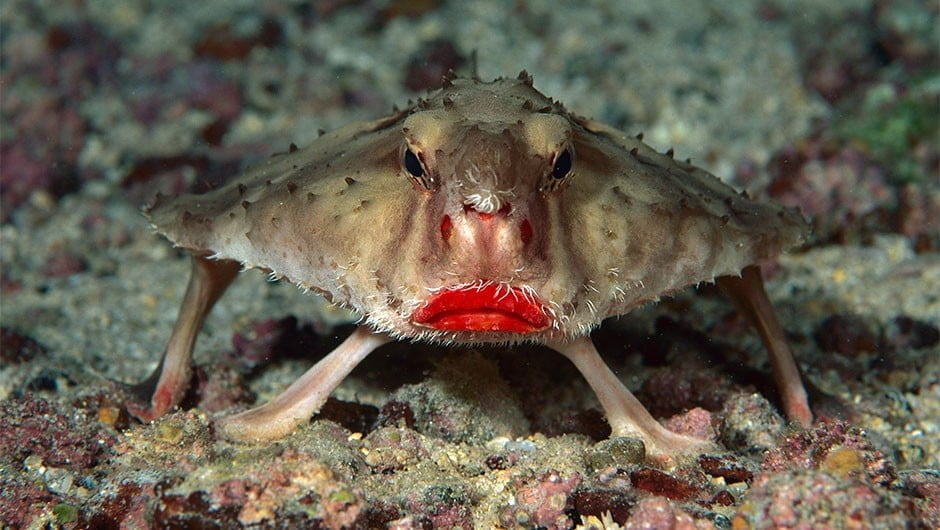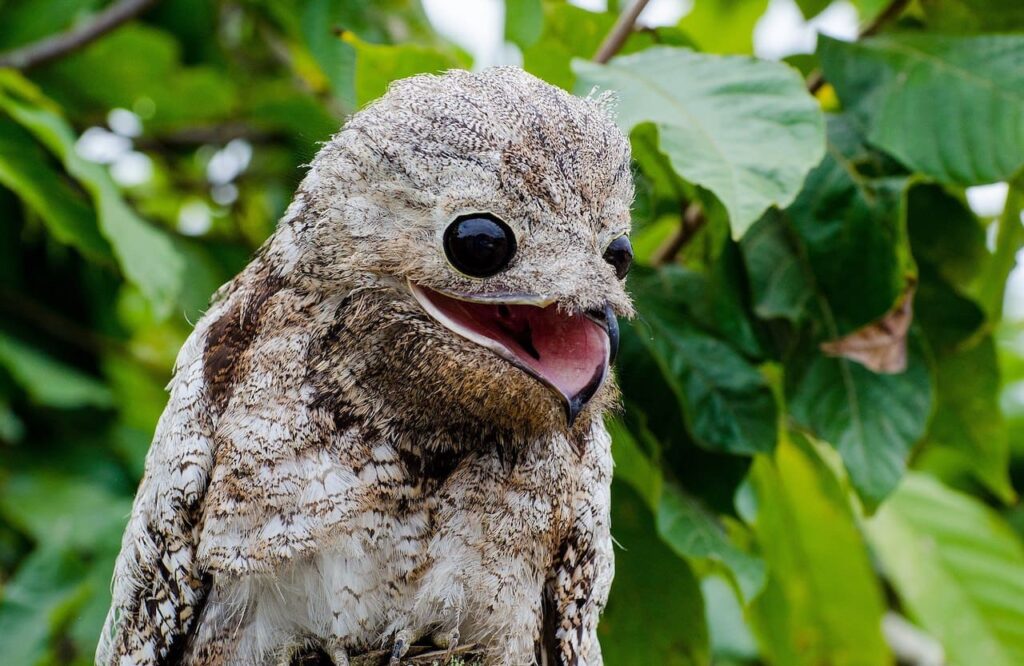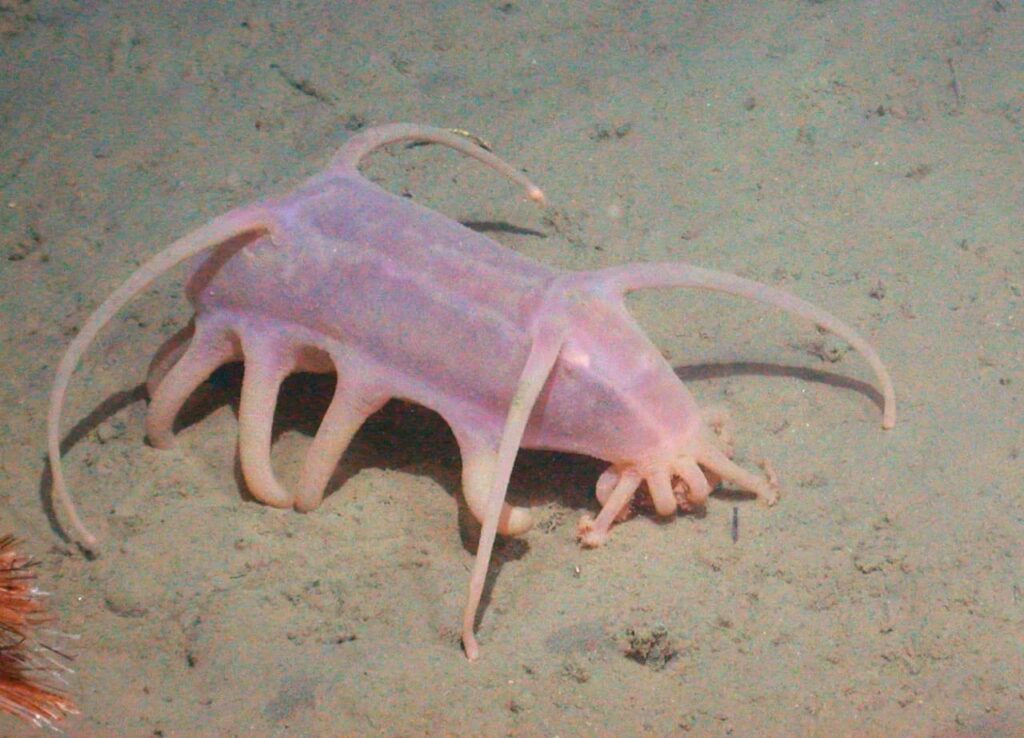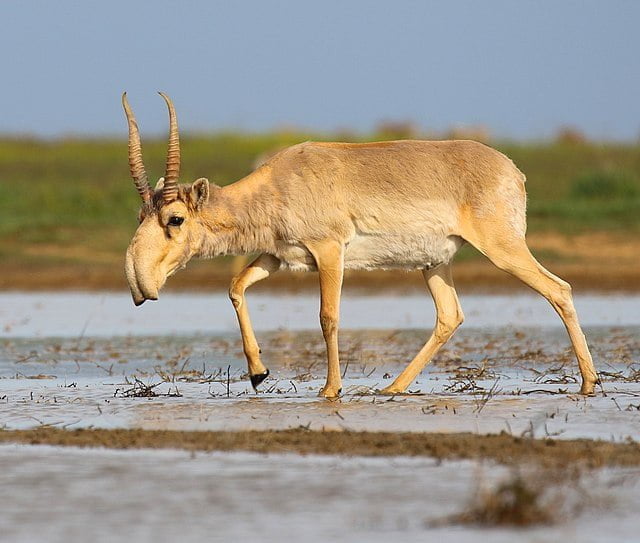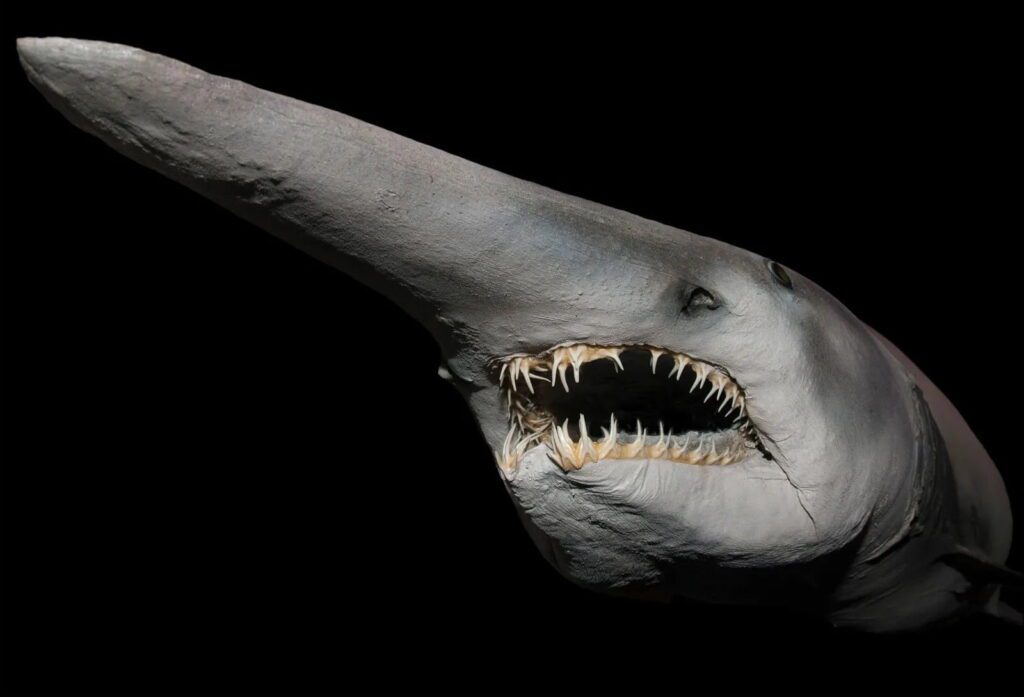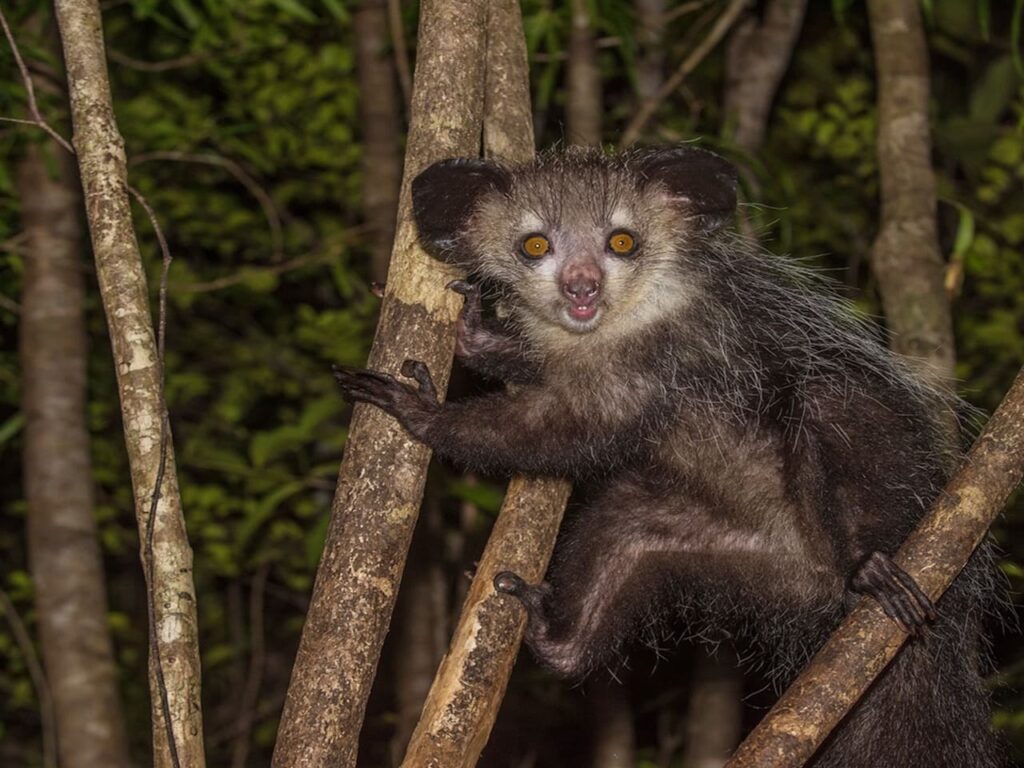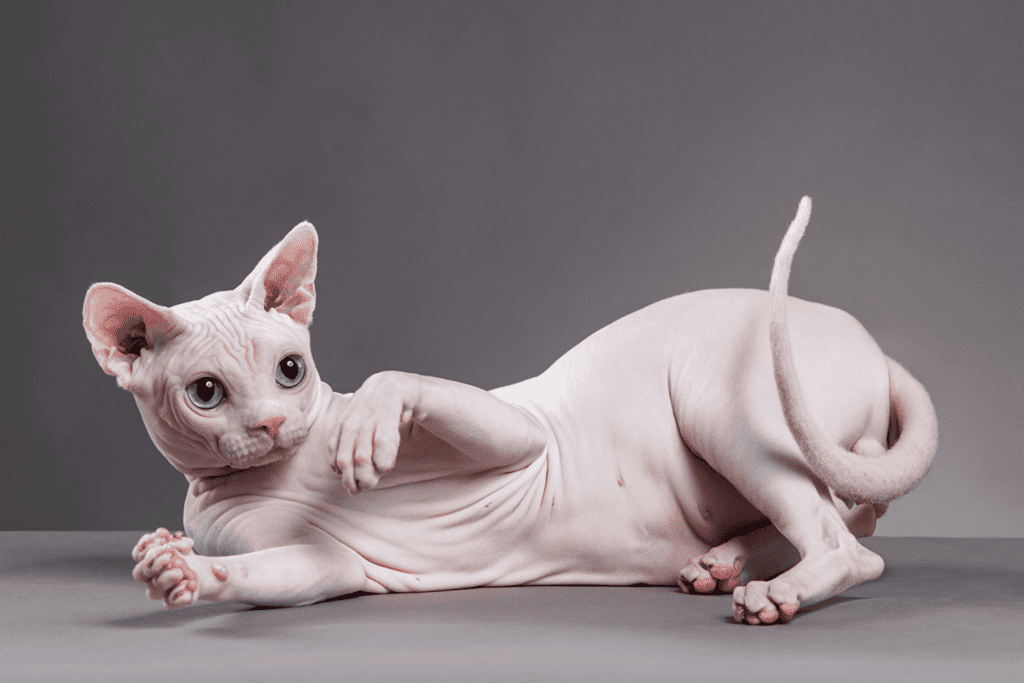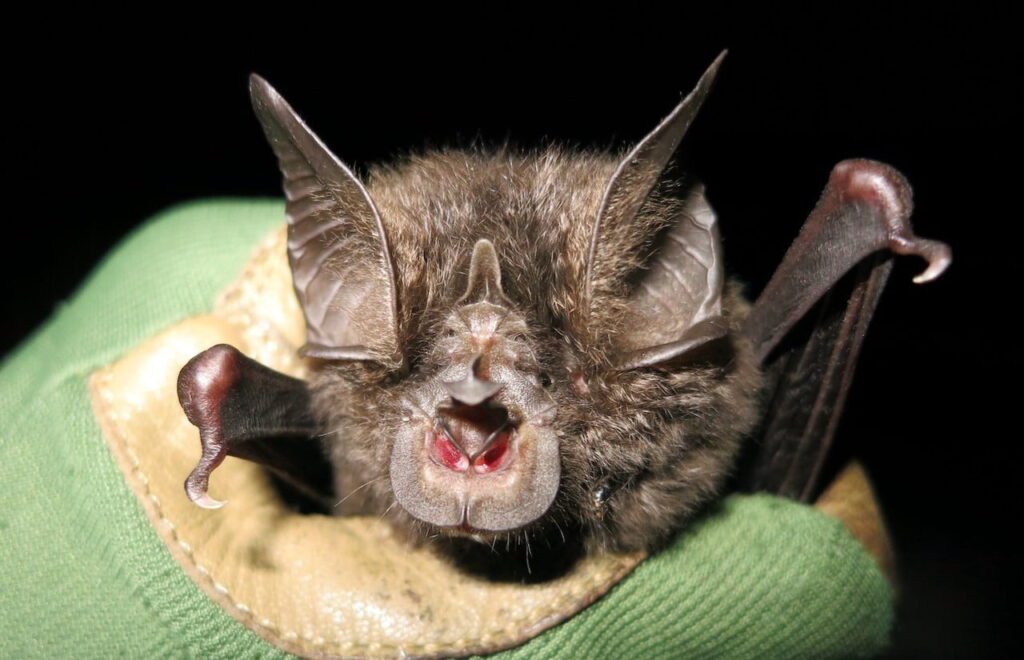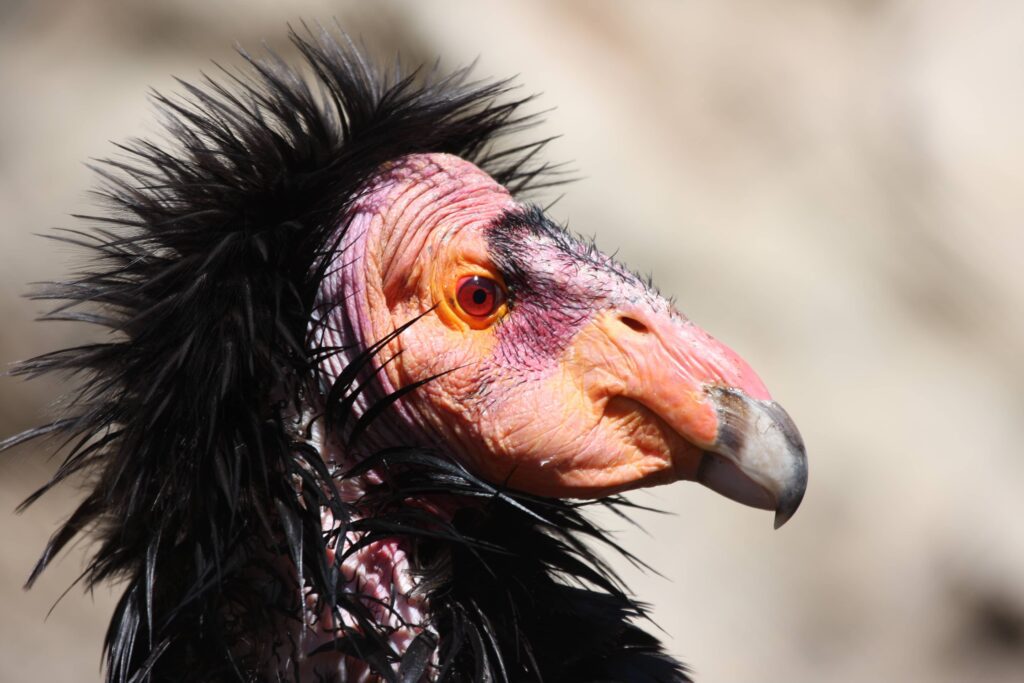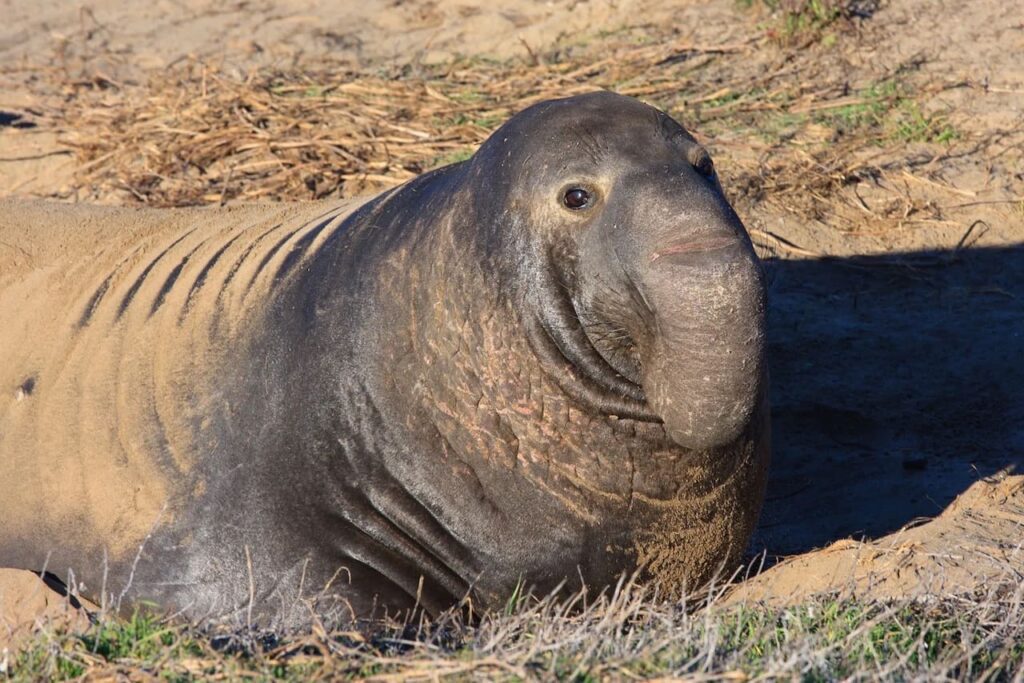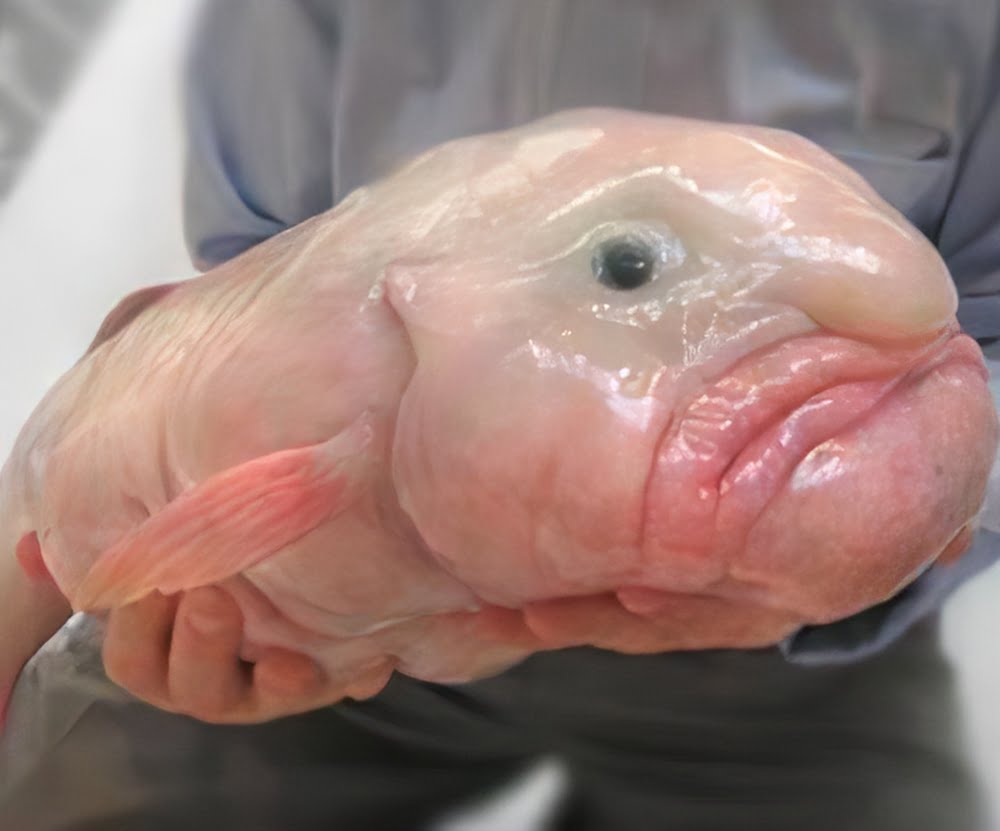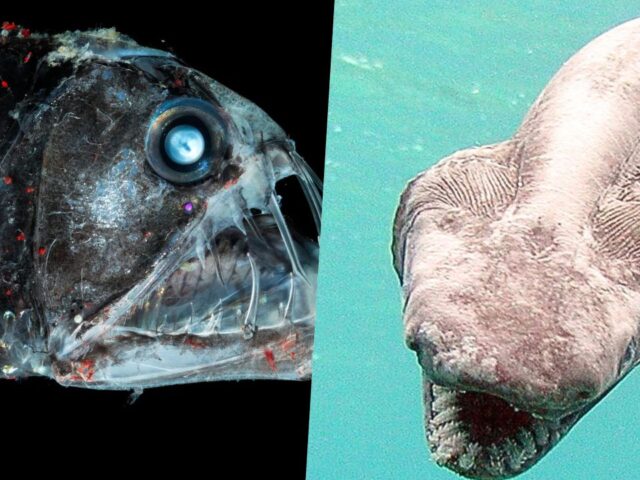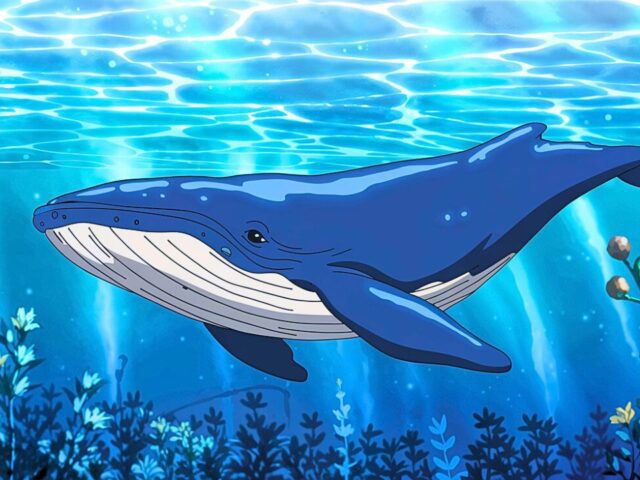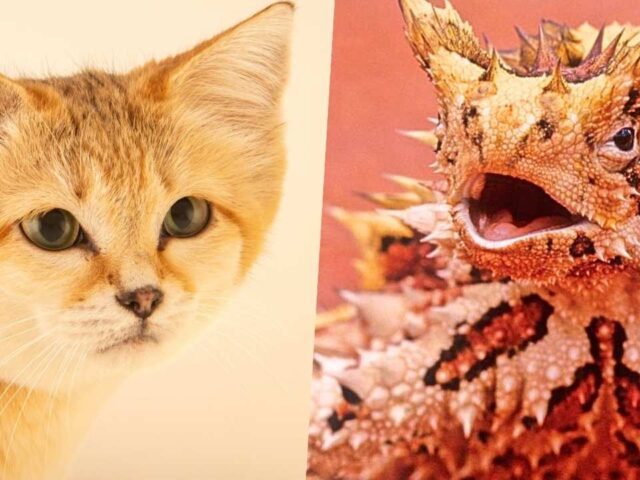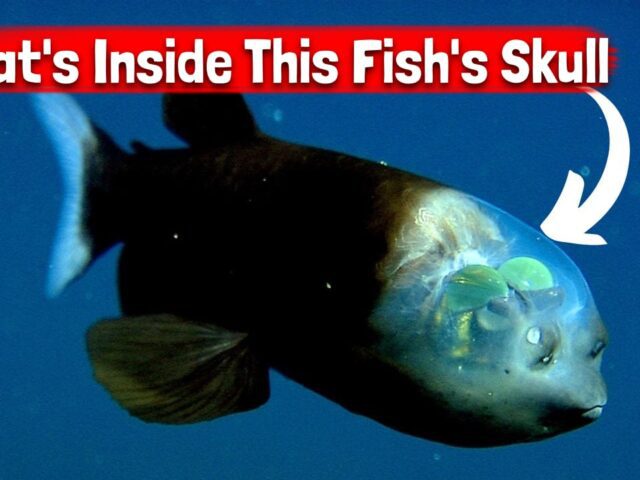Welcome, fellow animal lovers, to our rollicking journey through the wild and wacky world of the Top 40 Ugliest Animals! Our planet is home to an astounding array of creatures, from the cute and cuddly to the downright bizarre. In this article, we’re celebrating the weird, the strange, and the unconventional beauties of the animal kingdom. So buckle up, grab your sense of humor, and prepare to be amazed as we count down the most peculiar-looking critters that call Earth home.
Table of Contents
- 1. Here are Top 40 Ugliest Animals in the World
- 40. Cantor’s Giant Softshell Turtle
- 39. Alligator Snapping Turtle
- 38. Tapir
- 37. Sloane’s Viperfish
- 36. Monkfish
- 35. Wolffish
- 34. Pig-Nosed Turtle
- 33. Giant Isopod
- 32. Yeti Crab
- 31. Meishan Pig
- 30. Turtle Frog
- 29. Hammer-headed Bat
- 28. Angolan Free-Tailed Bat
- 27. Black Rain Frog
- 26. Aardvark
- 25. Giant Anteater
- 24. Indian Purple Frog
- 23. Titicaca Water Frog
- 22. Lamprey
- 21. Giant Chinese Salamander
- 20. Red-lipped Batfish
- 19. Naked Mole Rat
- 18. Potoo
- 17. Roti Island Snake Necked Turtle
- 16. Sea Pig
- 15. Star-nosed Mole
- 14. Axolotl
- 13. Marabou Stork
- 12. Saiga Antelope
- 11. Goblin Shark
- 10. Warthog
- 9. Aye-aye
- 8. Sphynx Cat
- 7. Horseshoe Bat
- 6. California Condor
- 5. Japanese Spider Crab
- 4. Tarsier
- 3. Elephant Seal
- 2. Proboscis Monkey
- 1. Blobfish
- 2. Conclusion
Here are Top 40 Ugliest Animals in the World
40. Cantor’s Giant Softshell Turtle
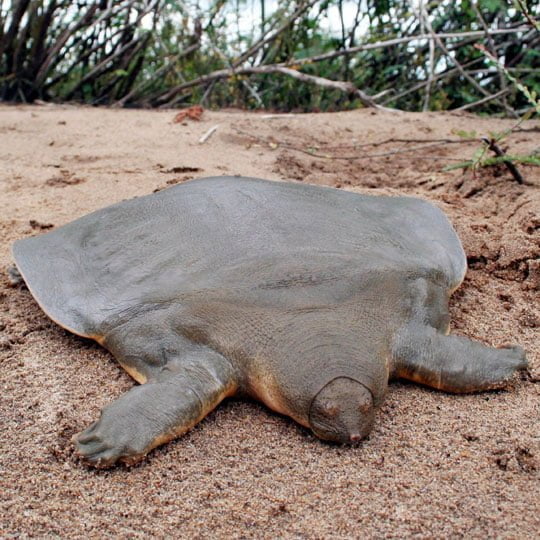
Scientific Name: Pelochelys cantorii
Family: Trionychidae
Habitat: Freshwater rivers and estuaries in Southeast Asia
Conservation status: Endangered
Behold! The pancake with eyes! Cantor’s giant softshell turtle has a flat, squishy body perfect for camouflaging itself in sandy riverbeds. While its stealth mode might be on point, its looks aren’t exactly winning any beauty contests. But hey, at least it’s got a great career as a pancake impersonator!
39. Alligator Snapping Turtle
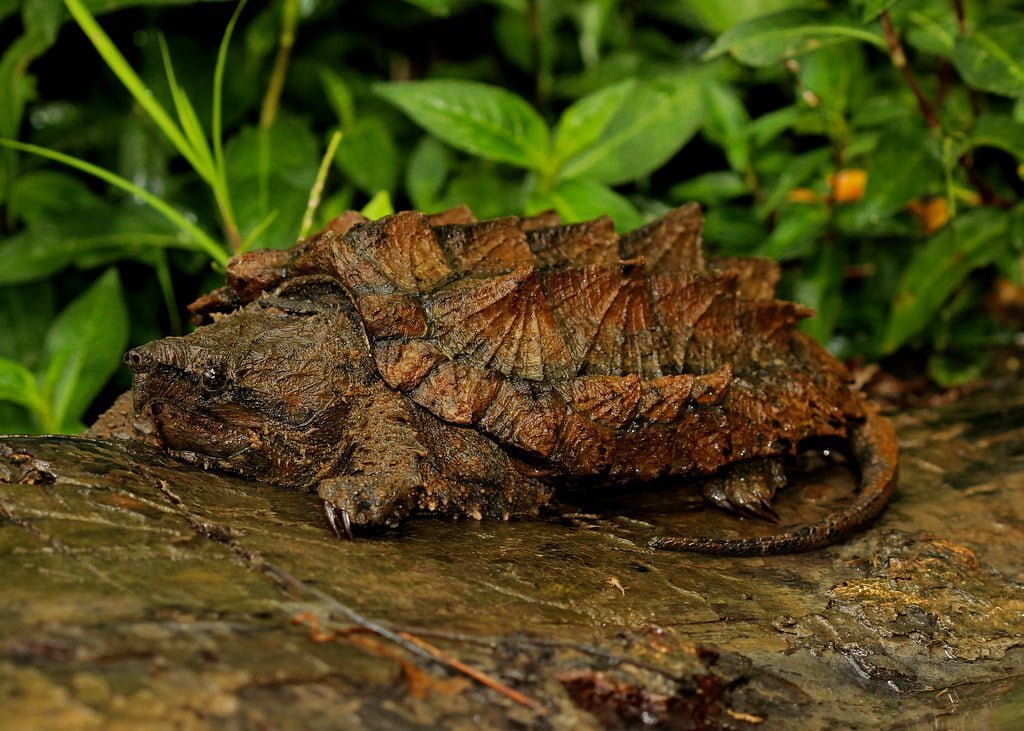
Scientific Name: Macrochelys temminckii
Family: Chelydridae
Habitat: Freshwater habitats in the southeastern United States
Conservation status: Vulnerable
Imagine a dinosaur and a turtle had a baby. Ta-da! Meet the Alligator snapping turtle. With its powerful jaws, spiked shell, and long, worm-like lure dangling from its mouth, it’s safe to say this guy ain’t winning any beauty pageants. But it sure knows how to catch dinner!
38. Tapir
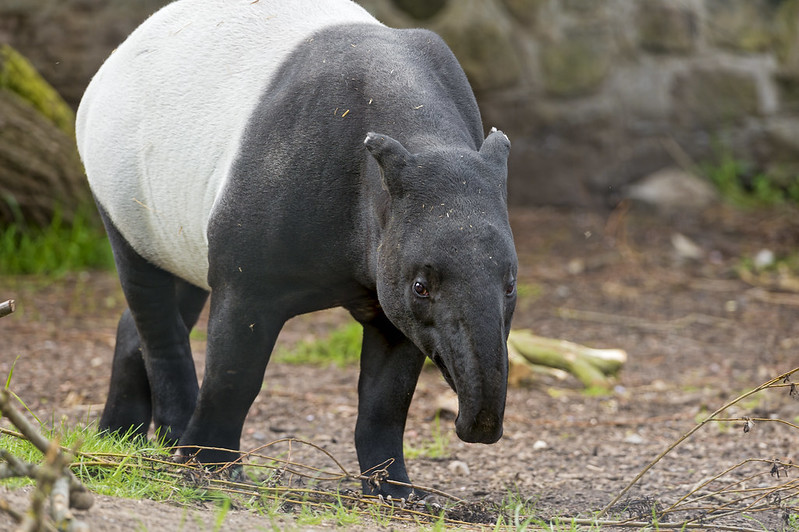
Genus: Tapirus
Family: Tapiridae
Habitat: Rainforests of Central and South America, and Southeast Asia
Conservation status: Varies by species, most are Endangered or Vulnerable
“What do you get when you cross an elephant with a pig?” The answer is Tapir! These odd-looking animals sport a trunk-like nose and a chubby pig-like body. While they might not be the most attractive creatures, they’re pretty darn good at navigating dense forests and munching on plants. Plus, who can resist those adorable baby tapirs?
37. Sloane’s Viperfish
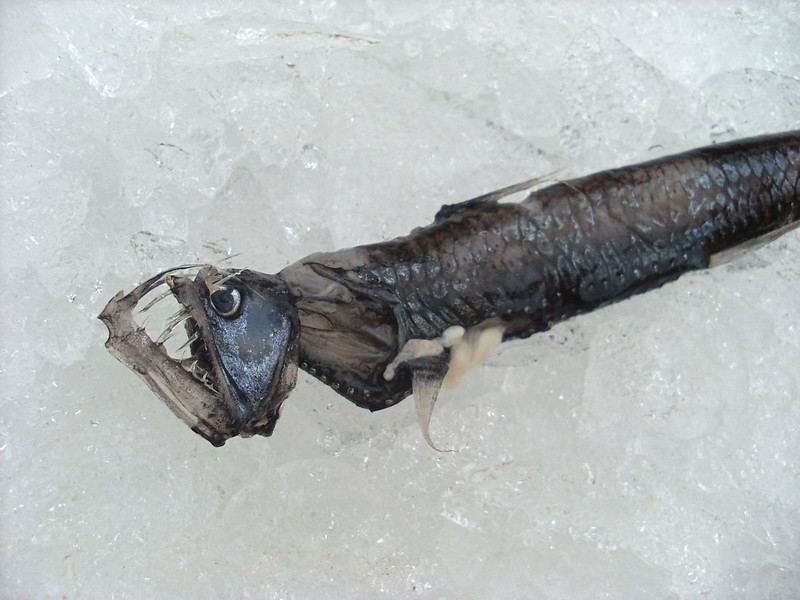
Scientific Name: Chauliodus sloani
Family: Stomiidae
Habitat: Deep-sea habitats worldwide
Conservation status: Not evaluated
Sloane’s viperfish is like the creepy, scary fish you’d imagine lurking in the dark depths of the ocean. With its long, needle-like teeth and glowing photophores, this fish is downright terrifying. But don’t worry, they’re too busy hunting other deep-sea creatures to care about us surface dwellers.
36. Monkfish
Scientific Name: Lophius piscatorius
Family: Lophiidae
Habitat: Coastal waters of the Atlantic Ocean
Conservation status: Not evaluated
What has an enormous mouth, a body that looks like it’s melting, and a fishing lure on its head? The Monkfish! This bizarre-looking fish has a face only a mother could love. But it’s a master of disguise, hiding on the ocean floor and luring in prey with its built-in fishing rod. Beauty is overrated, anyway. Survival skills are where it’s at!
35. Wolffish
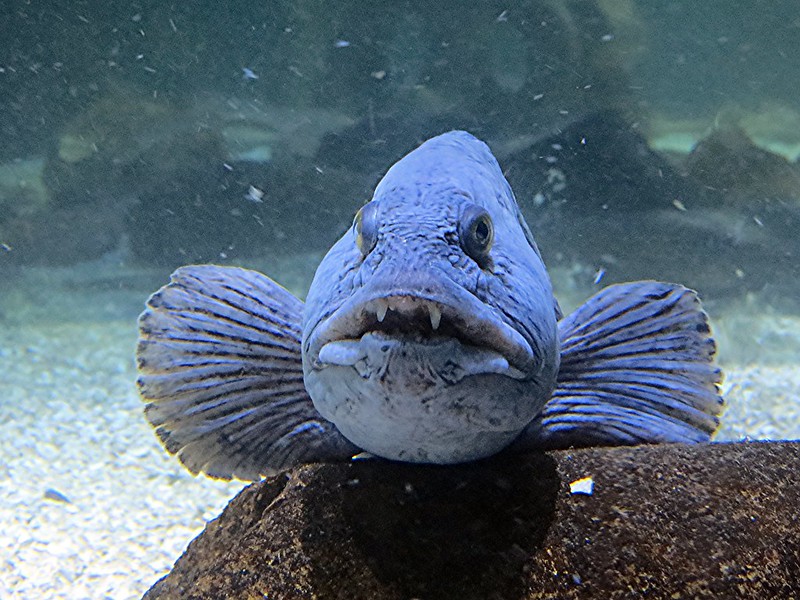
Scientific Name: Anarhichas lupus
Family: Anarhichadidae
Habitat: Cold marine waters of the North Atlantic
Conservation status: Near Threatened
Meet the grumpy grandpa of the sea, the Wolffish! This fish has a face that could scare a shark, with its rows of sharp teeth and frowning mouth. But hey, when you live in the cold depths of the ocean, a smile isn’t exactly a top priority.
34. Pig-Nosed Turtle
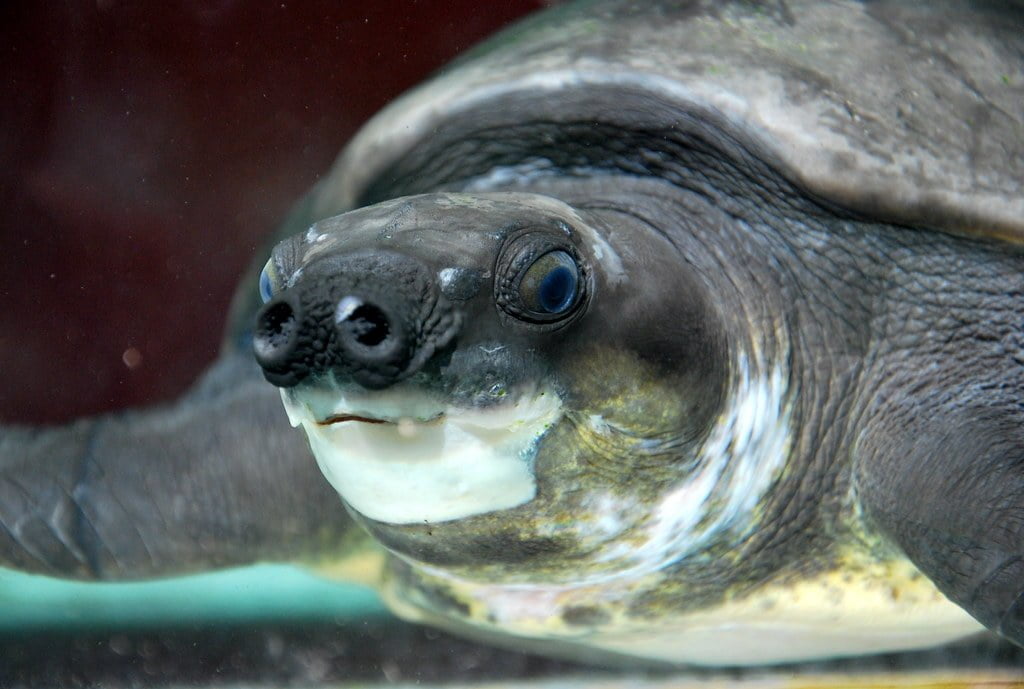
Scientific Name: Carettochelys insculpta
Family: Carettochelyidae
Habitat: Freshwater habitats in northern Australia and New Guinea
Conservation status: Vulnerable
Ever wondered what would happen if a turtle and a pig went on a blind date? Well, wonder no more! The Pig-Nosed Turtle is the lovechild of such a union. With its piggy snout and flippers, it’s got a unique look that makes it stand out from the turtle crowd. But hey, uniqueness is cool, right?
33. Giant Isopod
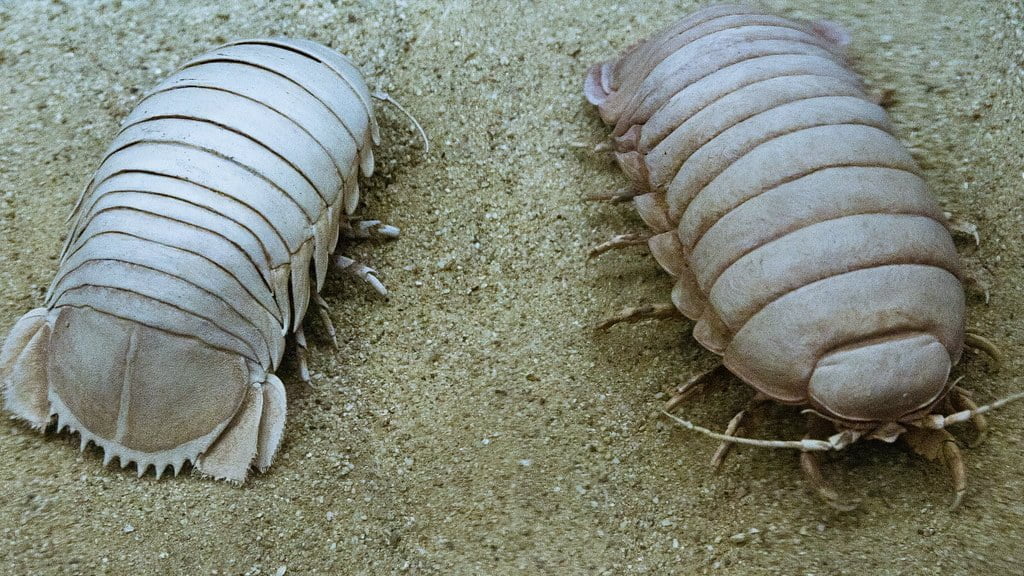
Scientific Name: Bathynomus giganteus
Family: Cirolanidae
Habitat: Cold, deep waters of the Atlantic, Pacific, and Indian Oceans
Conservation status: Not evaluated
Imagine a woodlouse decided to hit the gym, get swole, and become a deep-sea diver. That’s the Giant isopod for you! These enormous crustaceans are like something out of a sci-fi movie, with their alien-like exoskeletons and beady eyes. But don’t worry, they’re more interested in feasting on dead things than terrorizing the human race.
32. Yeti Crab
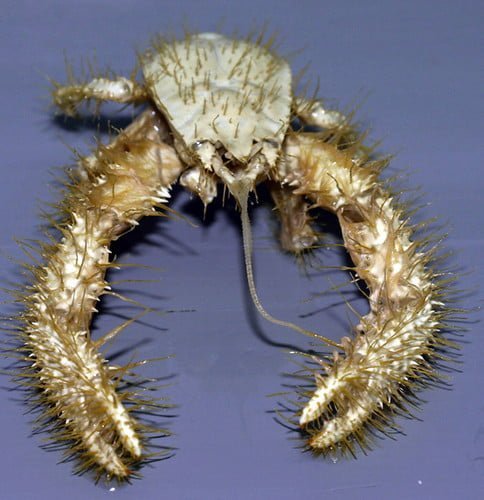
Scientific Name: Kiwa hirsuta
Family: Kiwaidae
Habitat: Deep-sea hydrothermal vents
Conservation status: Data Deficient
The Yeti Crab, a prime example of the ugliest animals, is like a creature straight out of a sci-fi movie! With its hairy, arm-like pincers and ghostly white coloration, this deep-sea crustacean looks like it’s been caught in a snowstorm. But those hairy appendages are actually covered in bacteria, which the Yeti Crab cultivates as a source of food. Talk about a hairy situation!
31. Meishan Pig
Breed: Meishan
Family: Suidae
Habitat: Originated in China, now found in various countries
Conservation status: Domesticated
The Meishan Pig is living proof that wrinkles can be adorable… sort of. This breed of pig is famous for its excessive folds of skin, droopy ears, and plump body. While it might not be winning any beauty contests, it sure knows how to win hearts with its friendly and docile nature.
30. Turtle Frog
Scientific Name: Myobatrachus gouldii
Family: Myobatrachidae
Habitat: Southwest Australia
Conservation status: Least Concern
Introducing the Turtle Frog, a creature that looks like a turtle that’s lost its shell! This round, chubby little frog has short, stubby limbs perfect for digging in sandy soil. It may not be the most attractive amphibian, but it’s definitely got the cute factor going for it!
29. Hammer-headed Bat
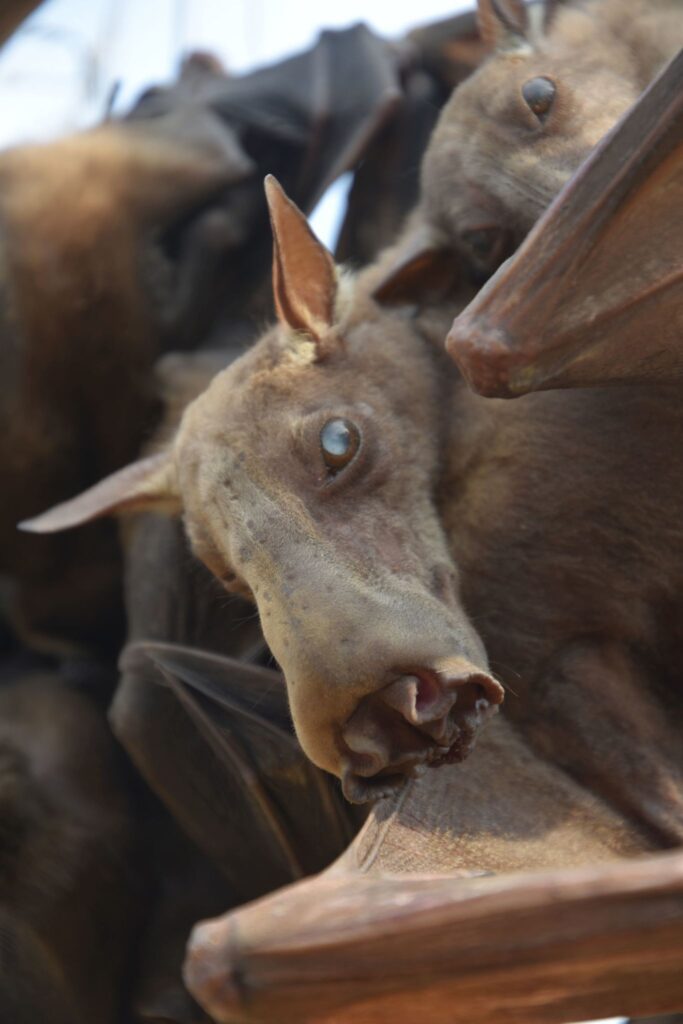
Scientific Name: Hypsignathus monstrosus
Family: Pteropodidae
Habitat: Rainforests of central and west Africa
Conservation status: Least Concern
If Dracula had a pet bat, it would probably be the Hammer-headed Bat. With its bizarre, hammer-shaped head and enormous wings, this bat looks like it belongs in a horror movie. But fear not, this fruit-eating flying mammal is more interested in finding a tasty meal than stalking humans.
28. Angolan Free-Tailed Bat
Scientific Name: Mops condylurus
Family: Molossidae
Habitat: Sub-Saharan Africa
Conservation status: Least Concern
What happens when a bat and a pug have a baby? The Angolan Free-Tailed Bat, of course! With its wrinkly face and squashed nose, this bat isn’t exactly a beauty and one of the most ugliest animals around. But its aerodynamic shape and agile flight make it a formidable hunter of insects in the night sky.
27. Black Rain Frog
Scientific Name: Breviceps fuscus
Family: Brevicipitidae
Habitat: South African forests
Conservation status: Near Threatened
The Black Rain Frog is basically a grumpy ball of goo. With its plump body, tiny limbs, and permanent frown, this frog looks like it’s been having a rough day (every day). But don’t let its appearance fool you—this frog is a master of camouflage, blending in perfectly with its forest habitat.
26. Aardvark
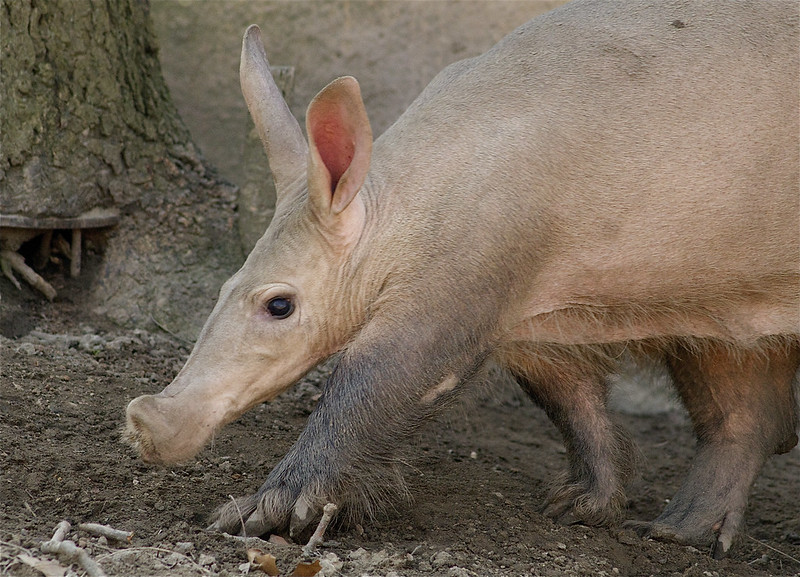
Scientific Name: Orycteropus afer
Family: Orycteropodidae
Habitat: Sub-Saharan Africa
Conservation status: Least Concern
Last but not least, say hello to the Aardvark, a creature that looks like it was assembled from spare parts of other animals. With its pig-like snout, rabbit-like ears, and kangaroo-like tail, the Aardvark is truly one-of-a-kind. But hey, it’s a termite-eating machine, so who cares if it’s not winning any beauty contests?
25. Giant Anteater
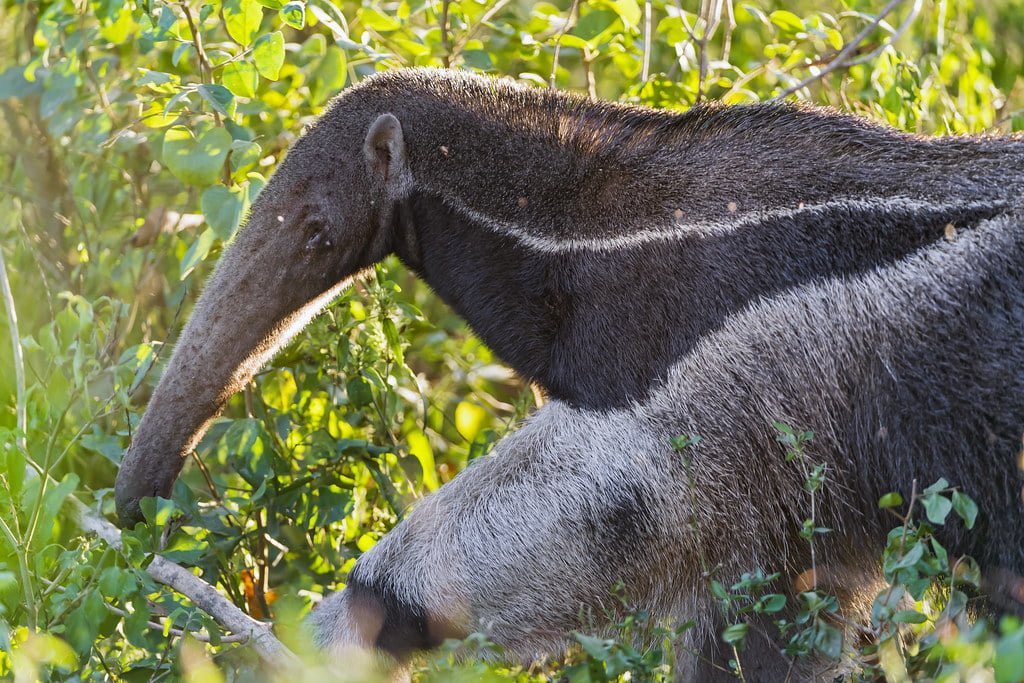
Scientific Name: Myrmecophaga tridactyla
Family: Myrmecophagidae
Habitat: Grasslands and rainforests of Central and South America
Conservation status: Vulnerable
The Giant Anteater is like the lovechild of a bear and a vacuum cleaner. With its long, bushy tail, elongated snout, and massive front claws, this animal looks like it belongs in a Dr. Seuss book. But don’t be fooled by its odd appearance—this critter is a pro at slurping up ants and termites with its long, sticky tongue.
24. Indian Purple Frog
Scientific Name: Nasikabatrachus sahyadrensis
Family: Nasikabatrachidae
Habitat: Western Ghats, India
Conservation status: Endangered
Imagine a blob of purple Play-Doh with tiny limbs and a pointy snout. Voila! You’ve got the Indian Purple Frog! This strange-looking amphibian spends most of its life underground, only emerging during the monsoon season to breed. Its peculiar appearance is certainly unforgettable and makes it one of the most ugliest animals in the world.
23. Titicaca Water Frog
Scientific Name: Telmatobius culeus
Family: Telmatobiidae
Habitat: Lake Titicaca in the Andean highlands
Conservation status: Critically Endangered
The Titicaca Water Frog looks like it’s wearing a wrinkly, oversized suit. With its saggy, baggy skin and bulbous eyes, this frog isn’t winning any beauty awards. But its excessive skin helps it absorb oxygen from the water, making it perfectly adapted to life in the high-altitude Lake Titicaca.
22. Lamprey
Scientific Name: Petromyzontiformes
Family: Petromyzontidae
Habitat: Freshwater and marine habitats worldwide
Conservation status: Varies by species
The Lamprey is the stuff of nightmares. This ancient, eel-like fish is armed with a round, tooth-filled mouth that looks like it belongs on a horror movie monster. While some lampreys are harmless filter-feeders, others latch onto fish and suck their blood. Yikes!
21. Giant Chinese Salamander
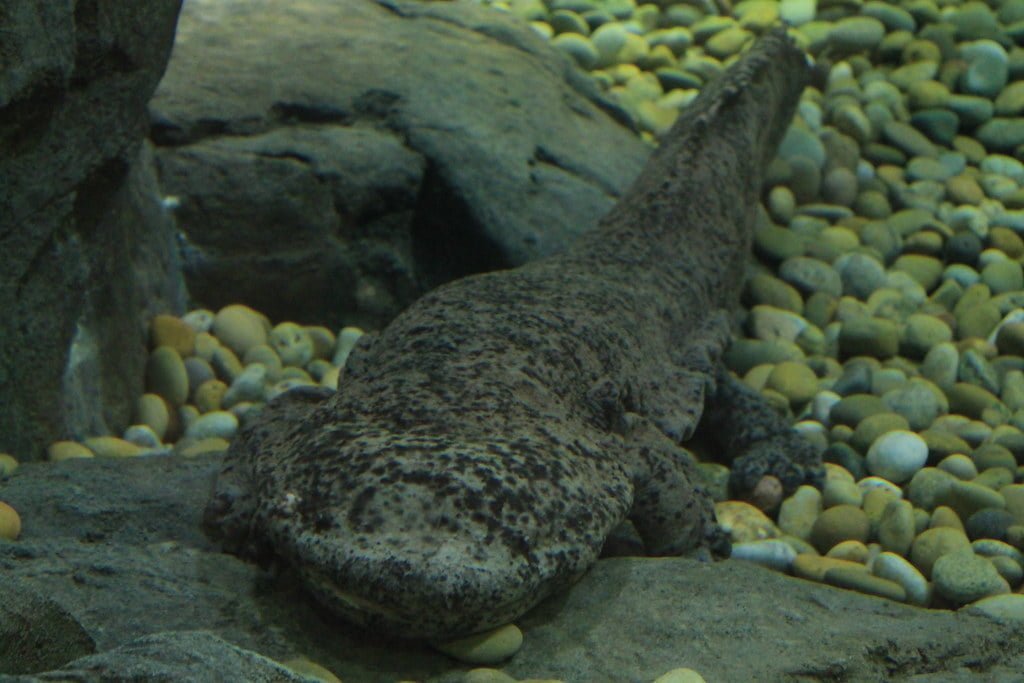
Scientific Name: Andrias davidianus
Family: Cryptobranchidae
Habitat: Freshwater habitats in China
Conservation status: Critically Endangered
The Giant Chinese Salamander looks like it’s been molded from a lump of clay. This enormous, slimy amphibian has wrinkled skin, tiny eyes, and a wide, flat head. But despite its less-than-stellar looks, it’s one of the world’s most ancient and unique creatures, having existed for millions of years.
20. Red-lipped Batfish
Scientific Name: Ogcocephalus darwini
Family: Ogcocephalidae
Habitat: Deep waters around the Galápagos Islands
Conservation status: Not evaluated
The Red-lipped Batfish looks like it’s been caught mid-makeover, with its bright red pout and awkward pose. This odd fish prefers walking on the ocean floor to swimming, using its modified fins as makeshift legs. If you ever wanted to see a fish in high heels and lipstick, here’s your chance!
19. Naked Mole Rat
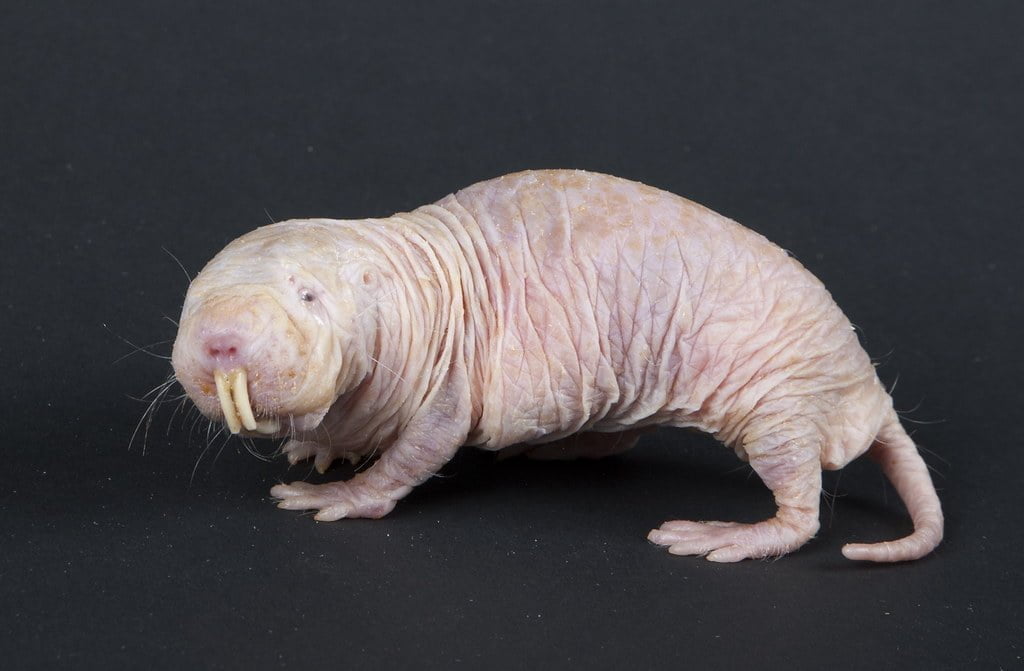
Scientific Name: Heterocephalus glaber
Family: Bathyergidae
Habitat: East African deserts
Conservation status: Least Concern
The Naked Mole Rat is a living example of how beauty is in the eye of the beholder. With its wrinkly, hairless body, buck teeth, and beady eyes, this subterranean rodent isn’t exactly a looker. But it’s a fascinating creature, with a unique social structure and incredible resistance to cancer.
18. Potoo
Scientific Name: Nyctibius spp.
Family: Nyctibiidae
Habitat: Tropical forests of Central and South America
Conservation status: Varies by species
The Potoo is the ultimate master of disguise, hiding in plain sight as it mimics a broken tree branch. With its wide, gaping mouth and startled expression, it looks like it’s perpetually surprised. But don’t let its appearance fool you—this nocturnal bird is an expert at catching insects on the wing.
17. Roti Island Snake Necked Turtle
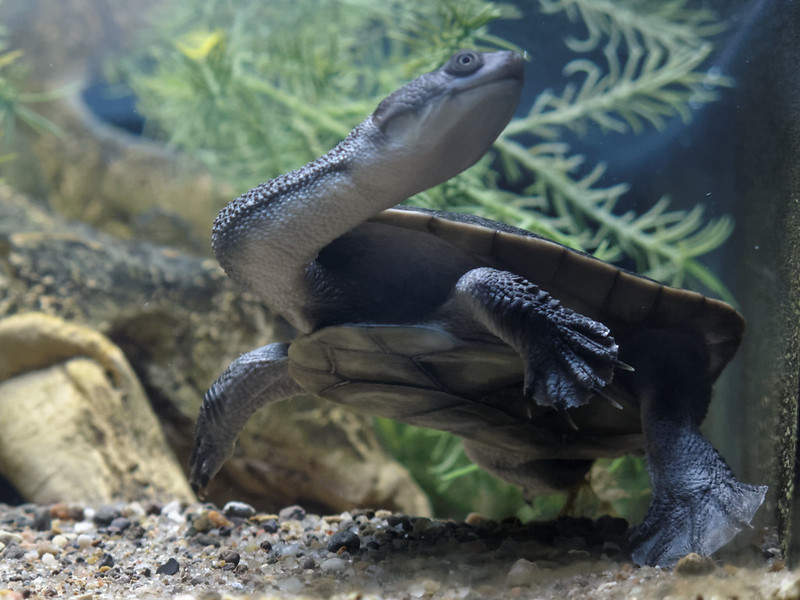
Scientific Name: Chelodina mccordi
Family: Chelidae
Habitat: Freshwater habitats on Rote Island, Indonesia
Conservation status: Critically Endangered
At first glance, you might think the Roti Island Snake Necked Turtle has a serious identity crisis. With its elongated, snake-like neck and small, flat shell, this peculiar reptile looks like it’s part snake, part turtle. But its unique appearance is perfect for ambush hunting in the shallow waters it calls home. A prime example of nature’s quirky creativity!
16. Sea Pig
Scientific Name: Scotoplanes spp.
Family: Elpidiidae
Habitat: Deep ocean floors worldwide
Conservation status: Not evaluated
Finally, meet the Sea Pig, a bizarre creature that looks like a living blob of pink goo. This deep-sea dweller is actually a type of sea cucumber, crawling along the ocean floor on tube-like feet. Its translucent, squishy body might not be the prettiest sight, but it’s perfectly adapted to life in the abyss.
15. Star-nosed Mole
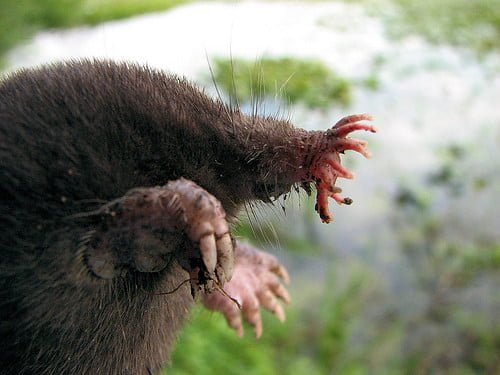
Scientific Name: Condylura cristata
Family: Talpidae
Habitat: Wetland areas of eastern North America
Conservation status: Least Concern
Behold the Star-nosed Mole, a small mammal that looks like it’s sporting a fleshy, pink starfish on its face, and a proud member of the ugliest animals club. This bizarre, 22-tentacle “nose” is actually an incredible sensory organ, helping the mole navigate its underground world and detect prey with lightning speed. It’s the superhero of the mole world!
14. Axolotl
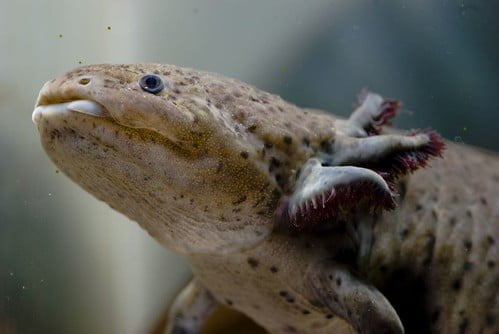
Scientific Name: Ambystoma mexicanum
Family: Ambystomatidae
Habitat: Lake Xochimilco, Mexico
Conservation status: Critically Endangered
The Axolotl is a walking (or should we say swimming) paradox. Simultaneously cute and weird-looking, this permanently-aquatic salamander sports feathery gills, a wide grin, and a regenerative ability that puts Wolverine to shame. It may not be conventionally attractive, but it’s definitely captivating.
13. Marabou Stork
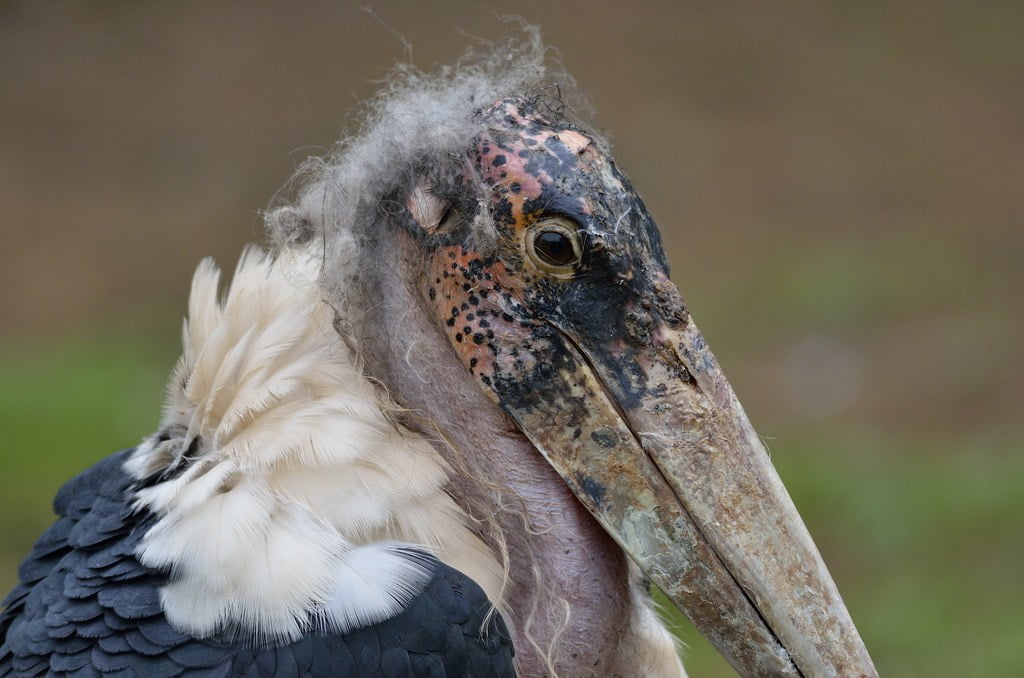
Scientific Name: Leptoptilos crumenifer
Family: Ciconiidae
Habitat: Sub-Saharan Africa
Conservation status: Least Concern
The Marabou Stork looks like a mad scientist’s creation gone wrong. With its bald, scabby head, massive wingspan, and a pouch of skin hanging from its neck, this scavenger bird isn’t winning any beauty contests. But its efficient, garbage-disposal role in its ecosystem makes it a valuable player.
12. Saiga Antelope
Scientific Name: Saiga tatarica
Family: Bovidae
Habitat: Eurasian steppe
Conservation status: Critically Endangered
If Dr. Seuss designed an antelope, it would be the Saiga. With its oversized, bulbous nose and strangely expressive eyes, this nomadic grazer is truly one of a kind. The Saiga’s unique schnoz helps it filter out dust and regulate its temperature in its harsh, arid habitat.
11. Goblin Shark
Scientific Name: Mitsukurina owstoni
Family: Mitsukurinidae
Habitat: Deep ocean waters worldwide
Conservation status: Least Concern
Meet the Goblin Shark, a deep-sea horror that looks like it escaped from a Tim Burton movie and secured a spot on the list of ugliest animals. With its protruding snout, translucent skin, and a jaw that extends like a nightmare, this elusive shark is both fascinating and terrifying. Luckily, it prefers to dwell in the darkest depths of the ocean.
10. Warthog
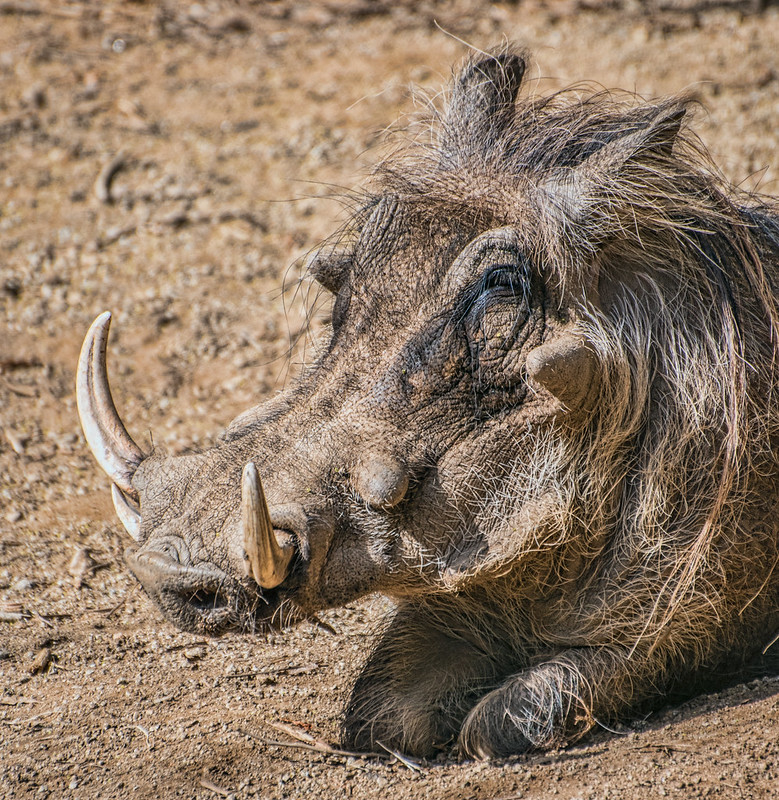
Scientific Name: Phacochoerus africanus
Family: Suidae
Habitat: African savannas and grasslands
Conservation status: Least Concern
With its mohawk-like mane, warty facial protuberances, and large curved tusks, the Warthog ranks among the ugliest animals out there. But despite its rough exterior, this wild pig is a tough survivor, adapted to life in the African wilderness. Plus, who can resist the charm of Pumbaa from The Lion King?
9. Aye-aye
Scientific Name: Daubentonia madagascariensis
Family: Daubentoniidae
Habitat: Rainforests of Madagascar
Conservation status: Endangered
The Aye-aye is a creature only a mother could love. With its wild tufts of hair, enormous ears, and a long, skeletal middle finger, this nocturnal primate looks like it belongs in a haunted house. But its unique appearance is perfectly suited for a life spent tapping on tree trunks in search of grubs.
8. Sphynx Cat
Scientific Name: Felis catus
Family: Felidae
Habitat: Domestic
Conservation status: Not applicable
The Sphynx Cat is proof that bald isn’t always beautiful. This hairless feline has wrinkled skin, oversized ears, and an intense gaze that can be both captivating and unnerving. But underneath its peculiar exterior, the Sphynx is a loving and sociable pet, making it a popular choice for cat lovers seeking something a little different.
7. Horseshoe Bat
Scientific Name: Rhinolophus spp.
Family: Rhinolophidae
Habitat: Various habitats worldwide
Conservation status: Varies by species
The Horseshoe Bat looks like it crash-landed face-first into a wall. With its oddly-shaped noseleaf and beady eyes, this bat is certainly one of the stranger-looking members of the Chiroptera order. But its unusual face is actually an adaptation for echolocation, helping it navigate its nocturnal world.
6. California Condor
Scientific Name: Gymnogyps californianus
Family: Cathartidae
Habitat: Mountainous regions of California and Baja California
Conservation status: Critically Endangered
The California Condor is a bird only a conservationist could love and that’s why we have included it in our list of ugliest animals in the world. With its bald, wrinkly head, massive wingspan, and penchant for scavenging, this vulture isn’t exactly easy on the eyes. But it’s an important part of its ecosystem, helping to clean up carcasses and prevent the spread of disease.
Also Read: 48 Most Beautiful Small Towns in California
5. Japanese Spider Crab
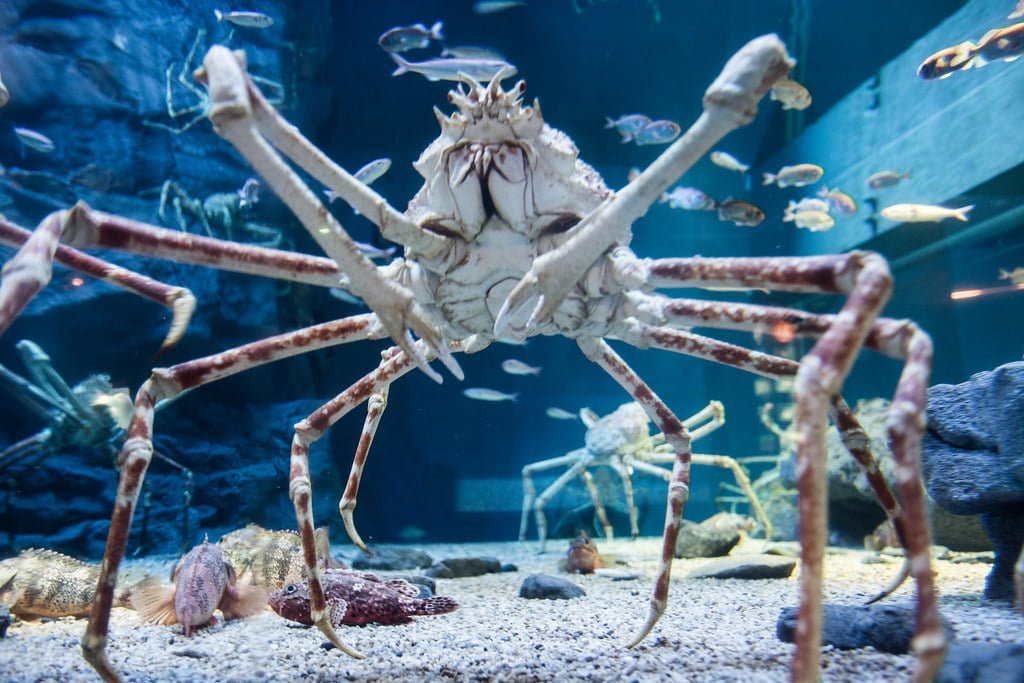
Scientific Name: Macrocheira kaempferi
Family: Inachidae
Habitat: Deep ocean waters around Japan
Conservation status: Data Deficient
Imagine a crab that looks like it could give even Spider-Man a run for his money! The Japanese Spider Crab, one of the world’s ugliest animals, is a creepy-crawly, long-legged crustacean with a leg span that can reach up to 12 feet (3.7 meters). It’s the largest crab in the world, and its spindly legs give it a distinctly arachnid appearance. Definitely not a creature you’d want to encounter in a dark alley—or undersea cavern!
4. Tarsier
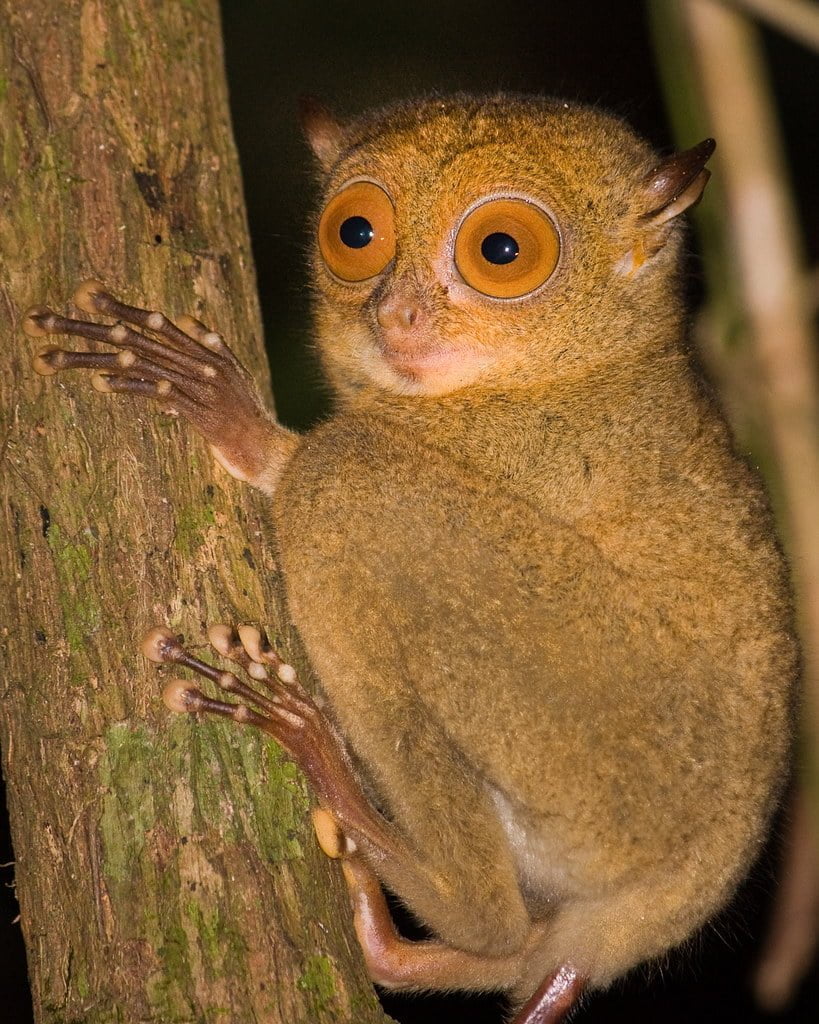
Family: Tarsiidae
Habitat: Southeast Asian forests
Conservation status: Varies by species
The Tarsier looks like it’s seen something truly shocking—with eyes bigger than its brain and a head that can rotate 180 degrees, this tiny primate is quite the sight. Its otherworldly appearance might not be conventionally attractive, but there’s something undeniably endearing about this nocturnal tree-dweller.
3. Elephant Seal
Scientific Name: Mirounga spp.
Family: Phocidae
Habitat: Subantarctic and Antarctic waters
Conservation status: Least Concern
Because of its bizarre appearance, Elephant seal earns a spot on our list of ugliest animals in the world. With its massive, trunk-like nose, blubbery body, and somewhat grumpy expression, this marine mammal is far from the most elegant creature in the animal kingdom. But its unique adaptations make it a formidable ocean survivor.
2. Proboscis Monkey
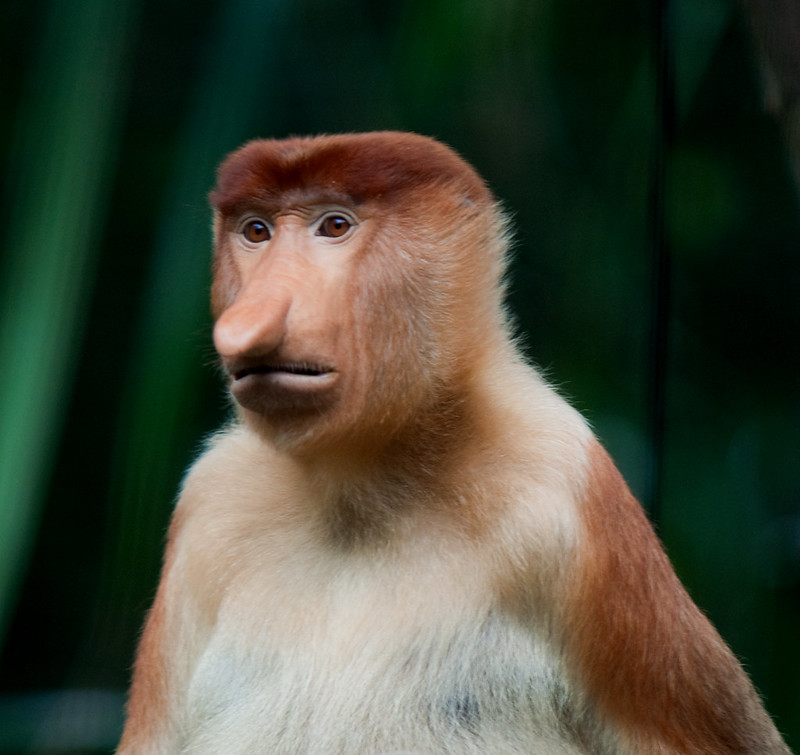
Scientific Name: Nasalis larvatus
Family: Cercopithecidae
Habitat: Borneo’s coastal mangroves and swamps
Conservation status: Endangered
The Proboscis Monkey is a prime example of how beauty is in the eye of the beholder. Its most striking feature, a bulbous, pendulous nose, might not be what we’d consider attractive, but it serves an important purpose in both communication and mate selection. Plus, it gives this tree-dwelling primate a truly unique profile.
1. Blobfish
Scientific Name: Psychrolutes marcidus
Family: Psychrolutidae
Habitat: Deep ocean waters off Australia and New Zealand
Conservation status: Not evaluated
Finally, meet what is probably one of the ugliest animals: the Blobfish, a creature that resembles a grumpy, gelatinous blob. This deep-sea dweller may not be the prettiest fish in the sea, but its gelatinous body is perfectly adapted to withstand the immense pressure of its deep-water home. So while it might not win any beauty contests, the Blobfish is a true survivor.
Conclusion
And there you have it, our hilariously entertaining romp through the world of the Top 40 Ugliest Animals has come to an end! We hope you’ve had a blast exploring the wild, wacky, and peculiar side of the animal kingdom with us.
Read More:

